Education Studies: Reflective Practice on Application of Theories
VerifiedAdded on 2023/06/12
|15
|4302
|480
Essay
AI Summary
This essay delves into reflective practice within education studies, focusing on various learning theories and their application. It explores the author's fascination with psychology and its relevance to understanding human behavior. The essay discusses classical conditioning, operant conditioning, social learning theory, Gestalt theory, and constructivism, highlighting their influence on learning processes. It also critically evaluates Herzberg's Two-factor Theory, Bourdieu's social capital theory, and Ausubel's deductive learning theory, examining their strengths and limitations in the context of education. The author reflects on how these theories have shaped their understanding of learning and teaching, emphasizing the importance of active participation and prior knowledge in effective learning.
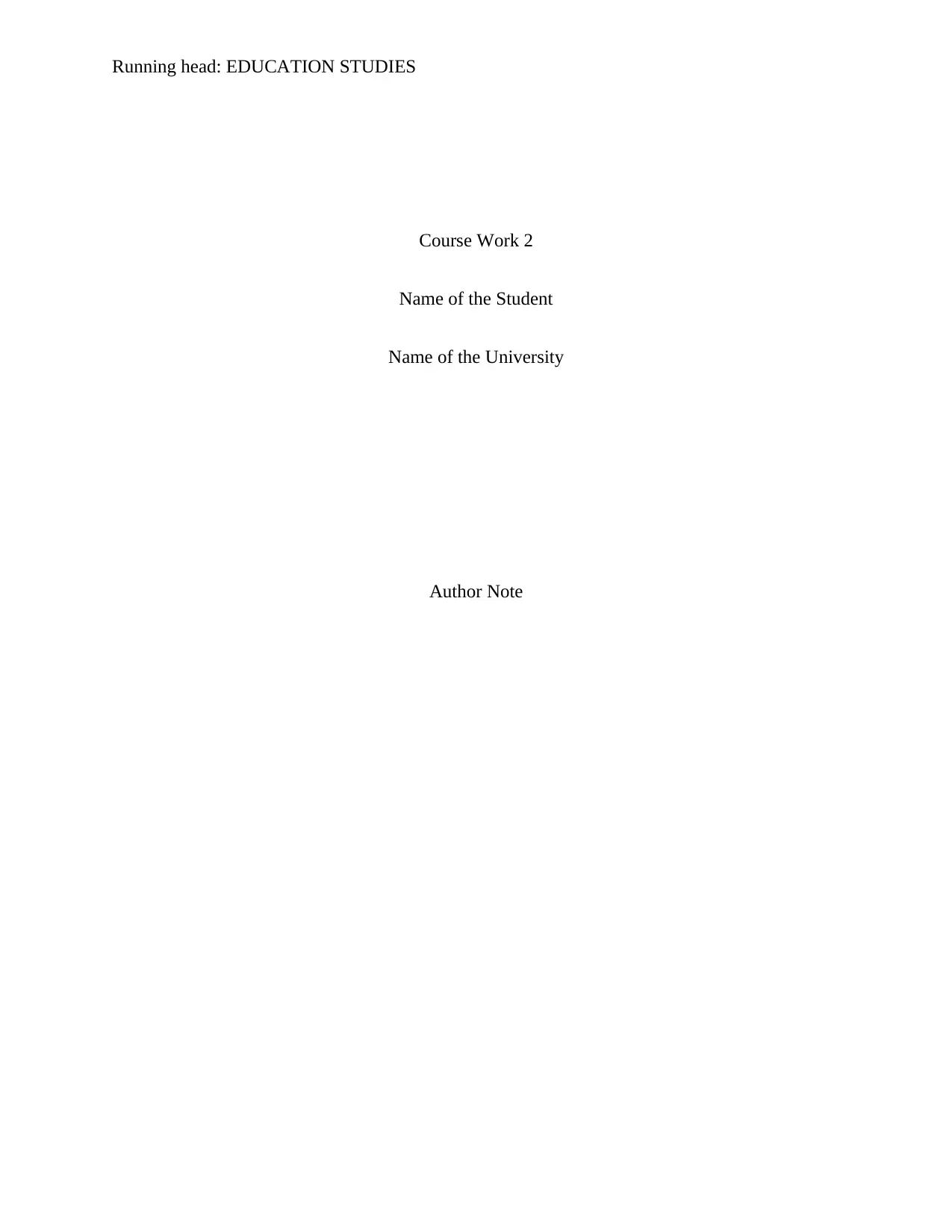
Running head: EDUCATION STUDIES
Course Work 2
Name of the Student
Name of the University
Author Note
Course Work 2
Name of the Student
Name of the University
Author Note
Paraphrase This Document
Need a fresh take? Get an instant paraphrase of this document with our AI Paraphraser
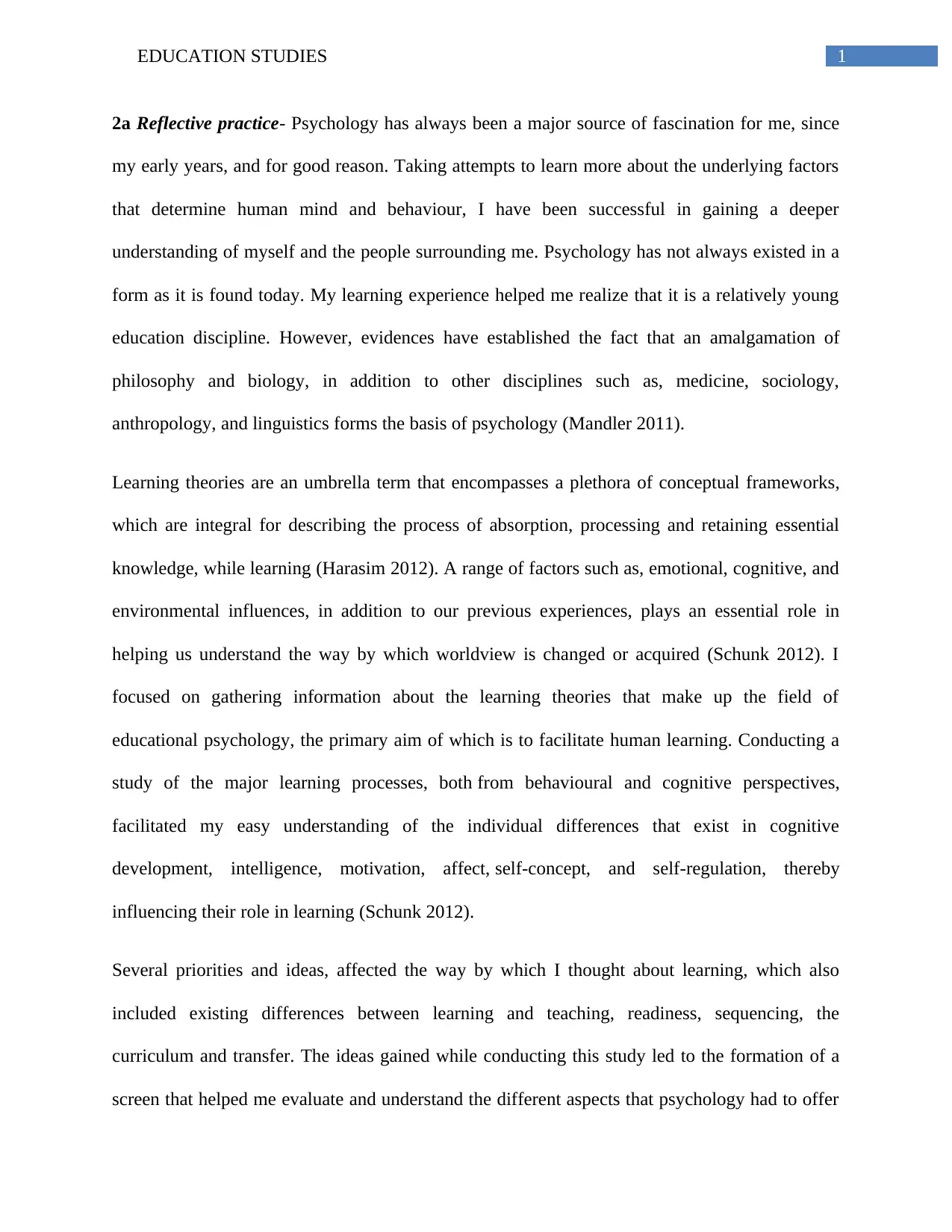
1EDUCATION STUDIES
2a Reflective practice- Psychology has always been a major source of fascination for me, since
my early years, and for good reason. Taking attempts to learn more about the underlying factors
that determine human mind and behaviour, I have been successful in gaining a deeper
understanding of myself and the people surrounding me. Psychology has not always existed in a
form as it is found today. My learning experience helped me realize that it is a relatively young
education discipline. However, evidences have established the fact that an amalgamation of
philosophy and biology, in addition to other disciplines such as, medicine, sociology,
anthropology, and linguistics forms the basis of psychology (Mandler 2011).
Learning theories are an umbrella term that encompasses a plethora of conceptual frameworks,
which are integral for describing the process of absorption, processing and retaining essential
knowledge, while learning (Harasim 2012). A range of factors such as, emotional, cognitive, and
environmental influences, in addition to our previous experiences, plays an essential role in
helping us understand the way by which worldview is changed or acquired (Schunk 2012). I
focused on gathering information about the learning theories that make up the field of
educational psychology, the primary aim of which is to facilitate human learning. Conducting a
study of the major learning processes, both from behavioural and cognitive perspectives,
facilitated my easy understanding of the individual differences that exist in cognitive
development, intelligence, motivation, affect, self-concept, and self-regulation, thereby
influencing their role in learning (Schunk 2012).
Several priorities and ideas, affected the way by which I thought about learning, which also
included existing differences between learning and teaching, readiness, sequencing, the
curriculum and transfer. The ideas gained while conducting this study led to the formation of a
screen that helped me evaluate and understand the different aspects that psychology had to offer
2a Reflective practice- Psychology has always been a major source of fascination for me, since
my early years, and for good reason. Taking attempts to learn more about the underlying factors
that determine human mind and behaviour, I have been successful in gaining a deeper
understanding of myself and the people surrounding me. Psychology has not always existed in a
form as it is found today. My learning experience helped me realize that it is a relatively young
education discipline. However, evidences have established the fact that an amalgamation of
philosophy and biology, in addition to other disciplines such as, medicine, sociology,
anthropology, and linguistics forms the basis of psychology (Mandler 2011).
Learning theories are an umbrella term that encompasses a plethora of conceptual frameworks,
which are integral for describing the process of absorption, processing and retaining essential
knowledge, while learning (Harasim 2012). A range of factors such as, emotional, cognitive, and
environmental influences, in addition to our previous experiences, plays an essential role in
helping us understand the way by which worldview is changed or acquired (Schunk 2012). I
focused on gathering information about the learning theories that make up the field of
educational psychology, the primary aim of which is to facilitate human learning. Conducting a
study of the major learning processes, both from behavioural and cognitive perspectives,
facilitated my easy understanding of the individual differences that exist in cognitive
development, intelligence, motivation, affect, self-concept, and self-regulation, thereby
influencing their role in learning (Schunk 2012).
Several priorities and ideas, affected the way by which I thought about learning, which also
included existing differences between learning and teaching, readiness, sequencing, the
curriculum and transfer. The ideas gained while conducting this study led to the formation of a
screen that helped me evaluate and understand the different aspects that psychology had to offer
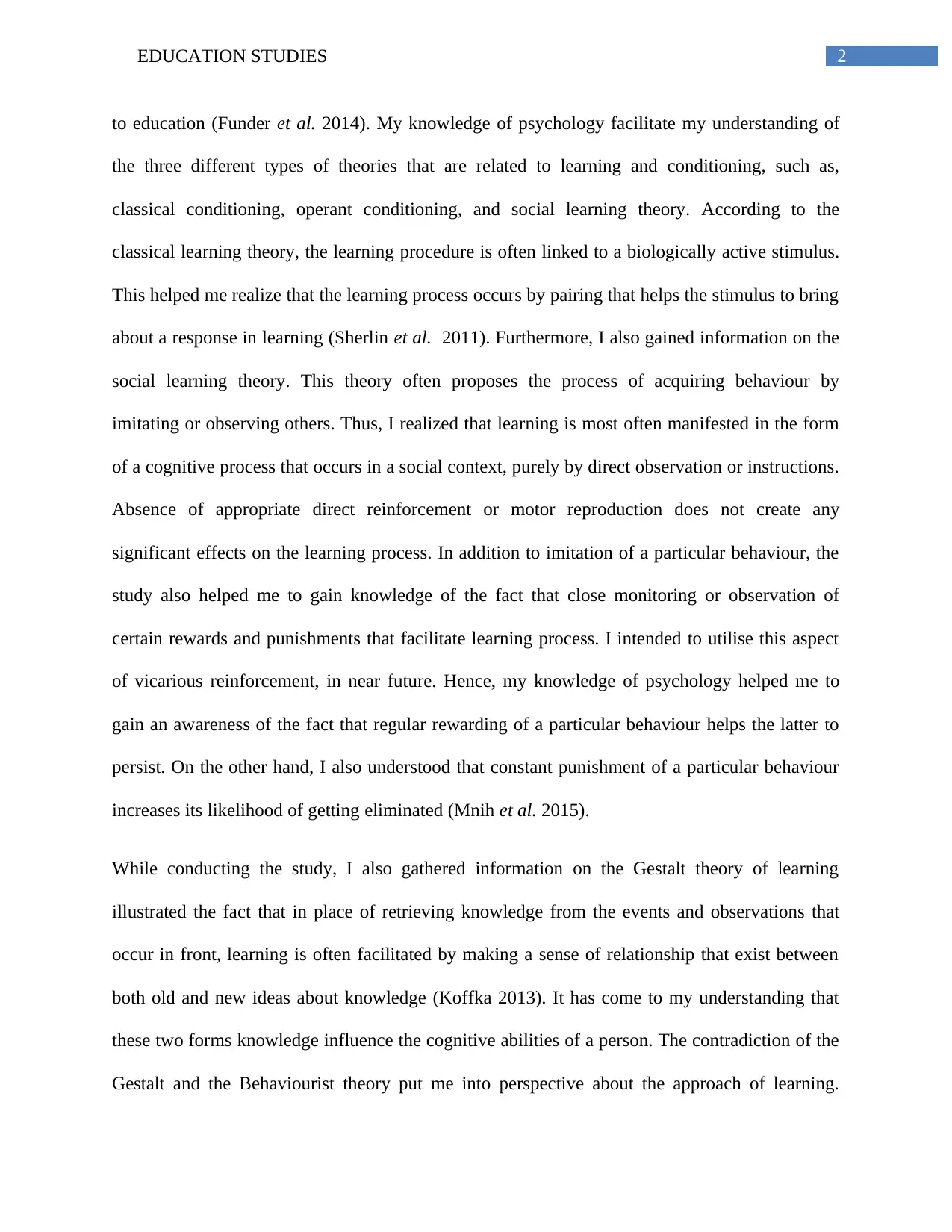
2EDUCATION STUDIES
to education (Funder et al. 2014). My knowledge of psychology facilitate my understanding of
the three different types of theories that are related to learning and conditioning, such as,
classical conditioning, operant conditioning, and social learning theory. According to the
classical learning theory, the learning procedure is often linked to a biologically active stimulus.
This helped me realize that the learning process occurs by pairing that helps the stimulus to bring
about a response in learning (Sherlin et al. 2011). Furthermore, I also gained information on the
social learning theory. This theory often proposes the process of acquiring behaviour by
imitating or observing others. Thus, I realized that learning is most often manifested in the form
of a cognitive process that occurs in a social context, purely by direct observation or instructions.
Absence of appropriate direct reinforcement or motor reproduction does not create any
significant effects on the learning process. In addition to imitation of a particular behaviour, the
study also helped me to gain knowledge of the fact that close monitoring or observation of
certain rewards and punishments that facilitate learning process. I intended to utilise this aspect
of vicarious reinforcement, in near future. Hence, my knowledge of psychology helped me to
gain an awareness of the fact that regular rewarding of a particular behaviour helps the latter to
persist. On the other hand, I also understood that constant punishment of a particular behaviour
increases its likelihood of getting eliminated (Mnih et al. 2015).
While conducting the study, I also gathered information on the Gestalt theory of learning
illustrated the fact that in place of retrieving knowledge from the events and observations that
occur in front, learning is often facilitated by making a sense of relationship that exist between
both old and new ideas about knowledge (Koffka 2013). It has come to my understanding that
these two forms knowledge influence the cognitive abilities of a person. The contradiction of the
Gestalt and the Behaviourist theory put me into perspective about the approach of learning.
to education (Funder et al. 2014). My knowledge of psychology facilitate my understanding of
the three different types of theories that are related to learning and conditioning, such as,
classical conditioning, operant conditioning, and social learning theory. According to the
classical learning theory, the learning procedure is often linked to a biologically active stimulus.
This helped me realize that the learning process occurs by pairing that helps the stimulus to bring
about a response in learning (Sherlin et al. 2011). Furthermore, I also gained information on the
social learning theory. This theory often proposes the process of acquiring behaviour by
imitating or observing others. Thus, I realized that learning is most often manifested in the form
of a cognitive process that occurs in a social context, purely by direct observation or instructions.
Absence of appropriate direct reinforcement or motor reproduction does not create any
significant effects on the learning process. In addition to imitation of a particular behaviour, the
study also helped me to gain knowledge of the fact that close monitoring or observation of
certain rewards and punishments that facilitate learning process. I intended to utilise this aspect
of vicarious reinforcement, in near future. Hence, my knowledge of psychology helped me to
gain an awareness of the fact that regular rewarding of a particular behaviour helps the latter to
persist. On the other hand, I also understood that constant punishment of a particular behaviour
increases its likelihood of getting eliminated (Mnih et al. 2015).
While conducting the study, I also gathered information on the Gestalt theory of learning
illustrated the fact that in place of retrieving knowledge from the events and observations that
occur in front, learning is often facilitated by making a sense of relationship that exist between
both old and new ideas about knowledge (Koffka 2013). It has come to my understanding that
these two forms knowledge influence the cognitive abilities of a person. The contradiction of the
Gestalt and the Behaviourist theory put me into perspective about the approach of learning.
⊘ This is a preview!⊘
Do you want full access?
Subscribe today to unlock all pages.

Trusted by 1+ million students worldwide
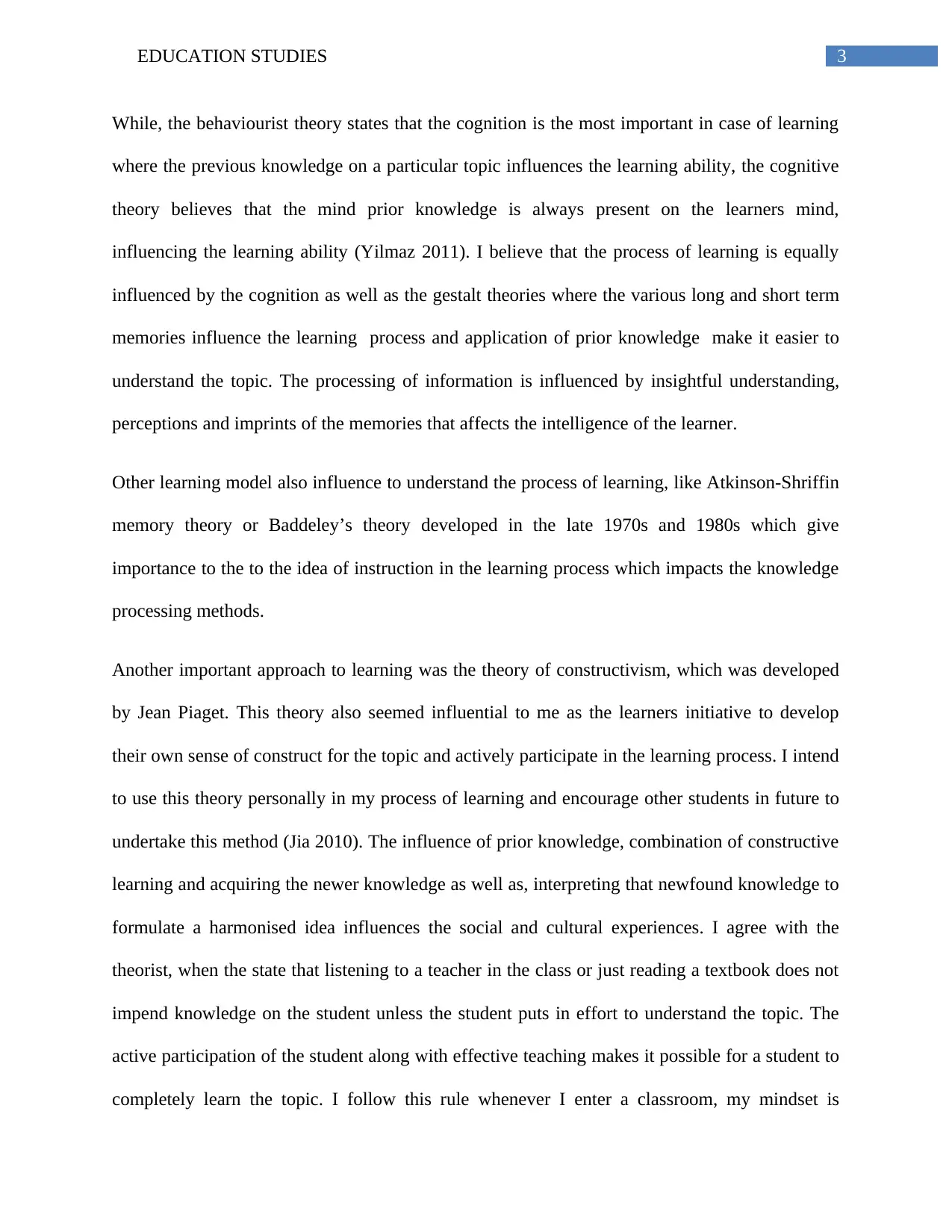
3EDUCATION STUDIES
While, the behaviourist theory states that the cognition is the most important in case of learning
where the previous knowledge on a particular topic influences the learning ability, the cognitive
theory believes that the mind prior knowledge is always present on the learners mind,
influencing the learning ability (Yilmaz 2011). I believe that the process of learning is equally
influenced by the cognition as well as the gestalt theories where the various long and short term
memories influence the learning process and application of prior knowledge make it easier to
understand the topic. The processing of information is influenced by insightful understanding,
perceptions and imprints of the memories that affects the intelligence of the learner.
Other learning model also influence to understand the process of learning, like Atkinson-Shriffin
memory theory or Baddeley’s theory developed in the late 1970s and 1980s which give
importance to the to the idea of instruction in the learning process which impacts the knowledge
processing methods.
Another important approach to learning was the theory of constructivism, which was developed
by Jean Piaget. This theory also seemed influential to me as the learners initiative to develop
their own sense of construct for the topic and actively participate in the learning process. I intend
to use this theory personally in my process of learning and encourage other students in future to
undertake this method (Jia 2010). The influence of prior knowledge, combination of constructive
learning and acquiring the newer knowledge as well as, interpreting that newfound knowledge to
formulate a harmonised idea influences the social and cultural experiences. I agree with the
theorist, when the state that listening to a teacher in the class or just reading a textbook does not
impend knowledge on the student unless the student puts in effort to understand the topic. The
active participation of the student along with effective teaching makes it possible for a student to
completely learn the topic. I follow this rule whenever I enter a classroom, my mindset is
While, the behaviourist theory states that the cognition is the most important in case of learning
where the previous knowledge on a particular topic influences the learning ability, the cognitive
theory believes that the mind prior knowledge is always present on the learners mind,
influencing the learning ability (Yilmaz 2011). I believe that the process of learning is equally
influenced by the cognition as well as the gestalt theories where the various long and short term
memories influence the learning process and application of prior knowledge make it easier to
understand the topic. The processing of information is influenced by insightful understanding,
perceptions and imprints of the memories that affects the intelligence of the learner.
Other learning model also influence to understand the process of learning, like Atkinson-Shriffin
memory theory or Baddeley’s theory developed in the late 1970s and 1980s which give
importance to the to the idea of instruction in the learning process which impacts the knowledge
processing methods.
Another important approach to learning was the theory of constructivism, which was developed
by Jean Piaget. This theory also seemed influential to me as the learners initiative to develop
their own sense of construct for the topic and actively participate in the learning process. I intend
to use this theory personally in my process of learning and encourage other students in future to
undertake this method (Jia 2010). The influence of prior knowledge, combination of constructive
learning and acquiring the newer knowledge as well as, interpreting that newfound knowledge to
formulate a harmonised idea influences the social and cultural experiences. I agree with the
theorist, when the state that listening to a teacher in the class or just reading a textbook does not
impend knowledge on the student unless the student puts in effort to understand the topic. The
active participation of the student along with effective teaching makes it possible for a student to
completely learn the topic. I follow this rule whenever I enter a classroom, my mindset is
Paraphrase This Document
Need a fresh take? Get an instant paraphrase of this document with our AI Paraphraser
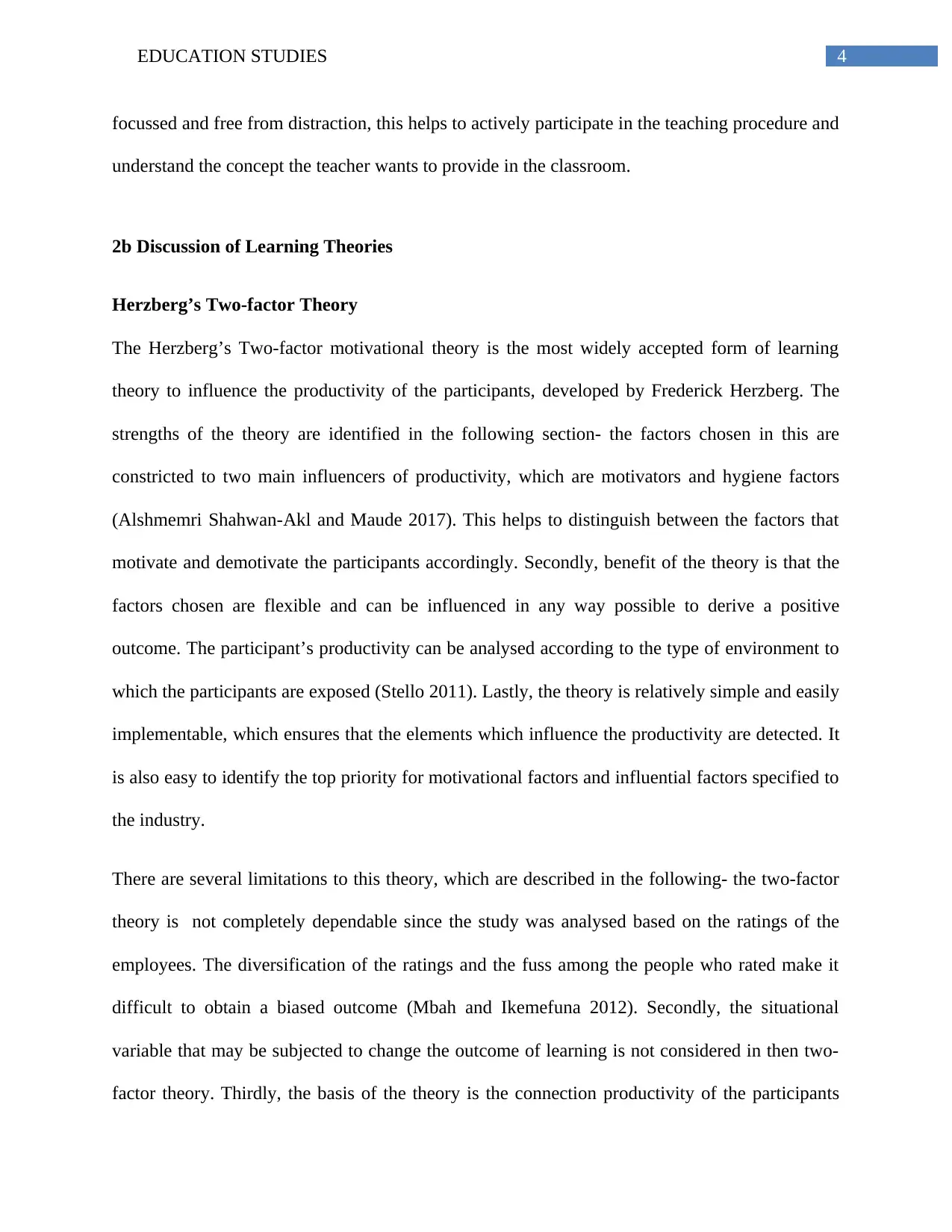
4EDUCATION STUDIES
focussed and free from distraction, this helps to actively participate in the teaching procedure and
understand the concept the teacher wants to provide in the classroom.
2b Discussion of Learning Theories
Herzberg’s Two-factor Theory
The Herzberg’s Two-factor motivational theory is the most widely accepted form of learning
theory to influence the productivity of the participants, developed by Frederick Herzberg. The
strengths of the theory are identified in the following section- the factors chosen in this are
constricted to two main influencers of productivity, which are motivators and hygiene factors
(Alshmemri Shahwan-Akl and Maude 2017). This helps to distinguish between the factors that
motivate and demotivate the participants accordingly. Secondly, benefit of the theory is that the
factors chosen are flexible and can be influenced in any way possible to derive a positive
outcome. The participant’s productivity can be analysed according to the type of environment to
which the participants are exposed (Stello 2011). Lastly, the theory is relatively simple and easily
implementable, which ensures that the elements which influence the productivity are detected. It
is also easy to identify the top priority for motivational factors and influential factors specified to
the industry.
There are several limitations to this theory, which are described in the following- the two-factor
theory is not completely dependable since the study was analysed based on the ratings of the
employees. The diversification of the ratings and the fuss among the people who rated make it
difficult to obtain a biased outcome (Mbah and Ikemefuna 2012). Secondly, the situational
variable that may be subjected to change the outcome of learning is not considered in then two-
factor theory. Thirdly, the basis of the theory is the connection productivity of the participants
focussed and free from distraction, this helps to actively participate in the teaching procedure and
understand the concept the teacher wants to provide in the classroom.
2b Discussion of Learning Theories
Herzberg’s Two-factor Theory
The Herzberg’s Two-factor motivational theory is the most widely accepted form of learning
theory to influence the productivity of the participants, developed by Frederick Herzberg. The
strengths of the theory are identified in the following section- the factors chosen in this are
constricted to two main influencers of productivity, which are motivators and hygiene factors
(Alshmemri Shahwan-Akl and Maude 2017). This helps to distinguish between the factors that
motivate and demotivate the participants accordingly. Secondly, benefit of the theory is that the
factors chosen are flexible and can be influenced in any way possible to derive a positive
outcome. The participant’s productivity can be analysed according to the type of environment to
which the participants are exposed (Stello 2011). Lastly, the theory is relatively simple and easily
implementable, which ensures that the elements which influence the productivity are detected. It
is also easy to identify the top priority for motivational factors and influential factors specified to
the industry.
There are several limitations to this theory, which are described in the following- the two-factor
theory is not completely dependable since the study was analysed based on the ratings of the
employees. The diversification of the ratings and the fuss among the people who rated make it
difficult to obtain a biased outcome (Mbah and Ikemefuna 2012). Secondly, the situational
variable that may be subjected to change the outcome of learning is not considered in then two-
factor theory. Thirdly, the basis of the theory is the connection productivity of the participants
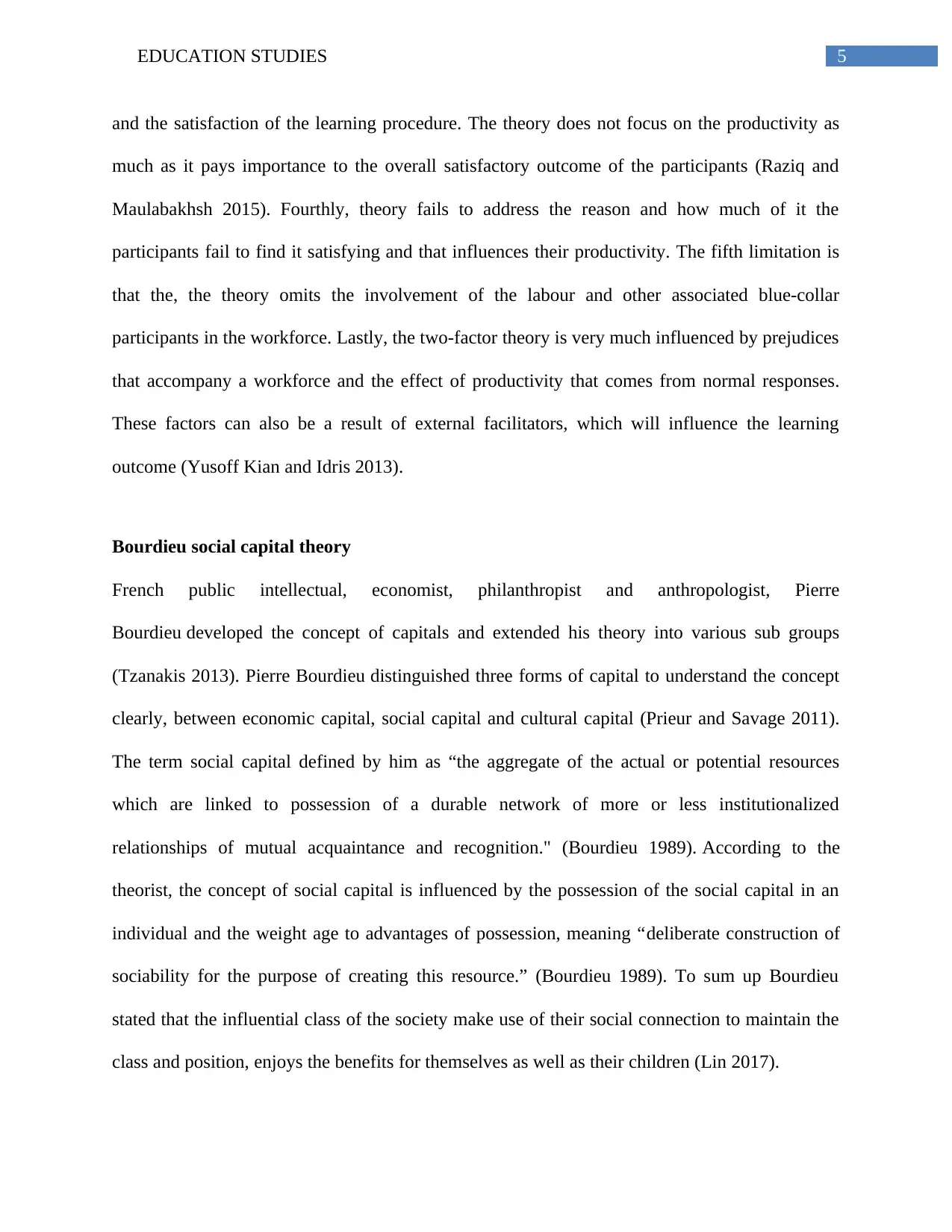
5EDUCATION STUDIES
and the satisfaction of the learning procedure. The theory does not focus on the productivity as
much as it pays importance to the overall satisfactory outcome of the participants (Raziq and
Maulabakhsh 2015). Fourthly, theory fails to address the reason and how much of it the
participants fail to find it satisfying and that influences their productivity. The fifth limitation is
that the, the theory omits the involvement of the labour and other associated blue-collar
participants in the workforce. Lastly, the two-factor theory is very much influenced by prejudices
that accompany a workforce and the effect of productivity that comes from normal responses.
These factors can also be a result of external facilitators, which will influence the learning
outcome (Yusoff Kian and Idris 2013).
Bourdieu social capital theory
French public intellectual, economist, philanthropist and anthropologist, Pierre
Bourdieu developed the concept of capitals and extended his theory into various sub groups
(Tzanakis 2013). Pierre Bourdieu distinguished three forms of capital to understand the concept
clearly, between economic capital, social capital and cultural capital (Prieur and Savage 2011).
The term social capital defined by him as “the aggregate of the actual or potential resources
which are linked to possession of a durable network of more or less institutionalized
relationships of mutual acquaintance and recognition." (Bourdieu 1989). According to the
theorist, the concept of social capital is influenced by the possession of the social capital in an
individual and the weight age to advantages of possession, meaning “deliberate construction of
sociability for the purpose of creating this resource.” (Bourdieu 1989). To sum up Bourdieu
stated that the influential class of the society make use of their social connection to maintain the
class and position, enjoys the benefits for themselves as well as their children (Lin 2017).
and the satisfaction of the learning procedure. The theory does not focus on the productivity as
much as it pays importance to the overall satisfactory outcome of the participants (Raziq and
Maulabakhsh 2015). Fourthly, theory fails to address the reason and how much of it the
participants fail to find it satisfying and that influences their productivity. The fifth limitation is
that the, the theory omits the involvement of the labour and other associated blue-collar
participants in the workforce. Lastly, the two-factor theory is very much influenced by prejudices
that accompany a workforce and the effect of productivity that comes from normal responses.
These factors can also be a result of external facilitators, which will influence the learning
outcome (Yusoff Kian and Idris 2013).
Bourdieu social capital theory
French public intellectual, economist, philanthropist and anthropologist, Pierre
Bourdieu developed the concept of capitals and extended his theory into various sub groups
(Tzanakis 2013). Pierre Bourdieu distinguished three forms of capital to understand the concept
clearly, between economic capital, social capital and cultural capital (Prieur and Savage 2011).
The term social capital defined by him as “the aggregate of the actual or potential resources
which are linked to possession of a durable network of more or less institutionalized
relationships of mutual acquaintance and recognition." (Bourdieu 1989). According to the
theorist, the concept of social capital is influenced by the possession of the social capital in an
individual and the weight age to advantages of possession, meaning “deliberate construction of
sociability for the purpose of creating this resource.” (Bourdieu 1989). To sum up Bourdieu
stated that the influential class of the society make use of their social connection to maintain the
class and position, enjoys the benefits for themselves as well as their children (Lin 2017).
⊘ This is a preview!⊘
Do you want full access?
Subscribe today to unlock all pages.

Trusted by 1+ million students worldwide
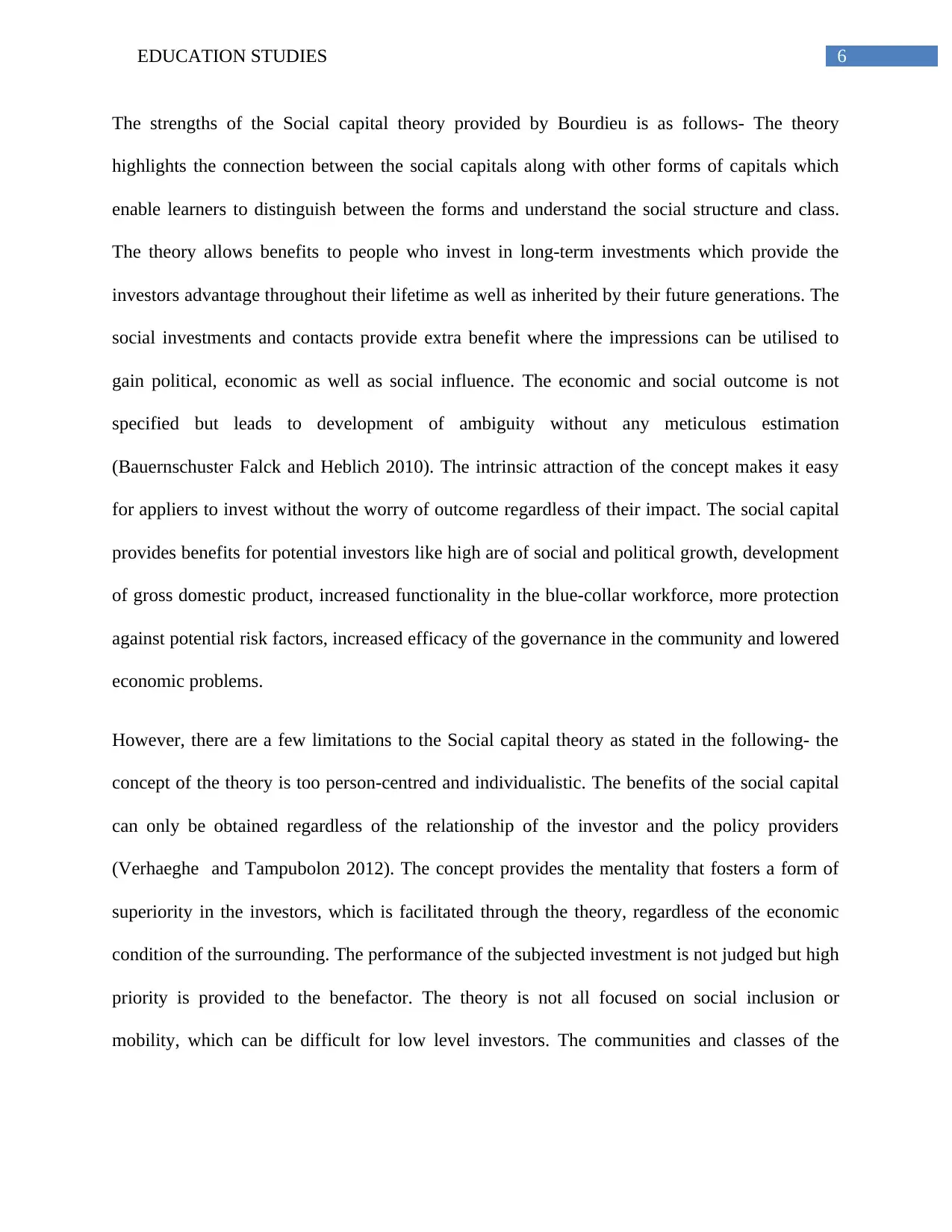
6EDUCATION STUDIES
The strengths of the Social capital theory provided by Bourdieu is as follows- The theory
highlights the connection between the social capitals along with other forms of capitals which
enable learners to distinguish between the forms and understand the social structure and class.
The theory allows benefits to people who invest in long-term investments which provide the
investors advantage throughout their lifetime as well as inherited by their future generations. The
social investments and contacts provide extra benefit where the impressions can be utilised to
gain political, economic as well as social influence. The economic and social outcome is not
specified but leads to development of ambiguity without any meticulous estimation
(Bauernschuster Falck and Heblich 2010). The intrinsic attraction of the concept makes it easy
for appliers to invest without the worry of outcome regardless of their impact. The social capital
provides benefits for potential investors like high are of social and political growth, development
of gross domestic product, increased functionality in the blue-collar workforce, more protection
against potential risk factors, increased efficacy of the governance in the community and lowered
economic problems.
However, there are a few limitations to the Social capital theory as stated in the following- the
concept of the theory is too person-centred and individualistic. The benefits of the social capital
can only be obtained regardless of the relationship of the investor and the policy providers
(Verhaeghe and Tampubolon 2012). The concept provides the mentality that fosters a form of
superiority in the investors, which is facilitated through the theory, regardless of the economic
condition of the surrounding. The performance of the subjected investment is not judged but high
priority is provided to the benefactor. The theory is not all focused on social inclusion or
mobility, which can be difficult for low level investors. The communities and classes of the
The strengths of the Social capital theory provided by Bourdieu is as follows- The theory
highlights the connection between the social capitals along with other forms of capitals which
enable learners to distinguish between the forms and understand the social structure and class.
The theory allows benefits to people who invest in long-term investments which provide the
investors advantage throughout their lifetime as well as inherited by their future generations. The
social investments and contacts provide extra benefit where the impressions can be utilised to
gain political, economic as well as social influence. The economic and social outcome is not
specified but leads to development of ambiguity without any meticulous estimation
(Bauernschuster Falck and Heblich 2010). The intrinsic attraction of the concept makes it easy
for appliers to invest without the worry of outcome regardless of their impact. The social capital
provides benefits for potential investors like high are of social and political growth, development
of gross domestic product, increased functionality in the blue-collar workforce, more protection
against potential risk factors, increased efficacy of the governance in the community and lowered
economic problems.
However, there are a few limitations to the Social capital theory as stated in the following- the
concept of the theory is too person-centred and individualistic. The benefits of the social capital
can only be obtained regardless of the relationship of the investor and the policy providers
(Verhaeghe and Tampubolon 2012). The concept provides the mentality that fosters a form of
superiority in the investors, which is facilitated through the theory, regardless of the economic
condition of the surrounding. The performance of the subjected investment is not judged but high
priority is provided to the benefactor. The theory is not all focused on social inclusion or
mobility, which can be difficult for low level investors. The communities and classes of the
Paraphrase This Document
Need a fresh take? Get an instant paraphrase of this document with our AI Paraphraser
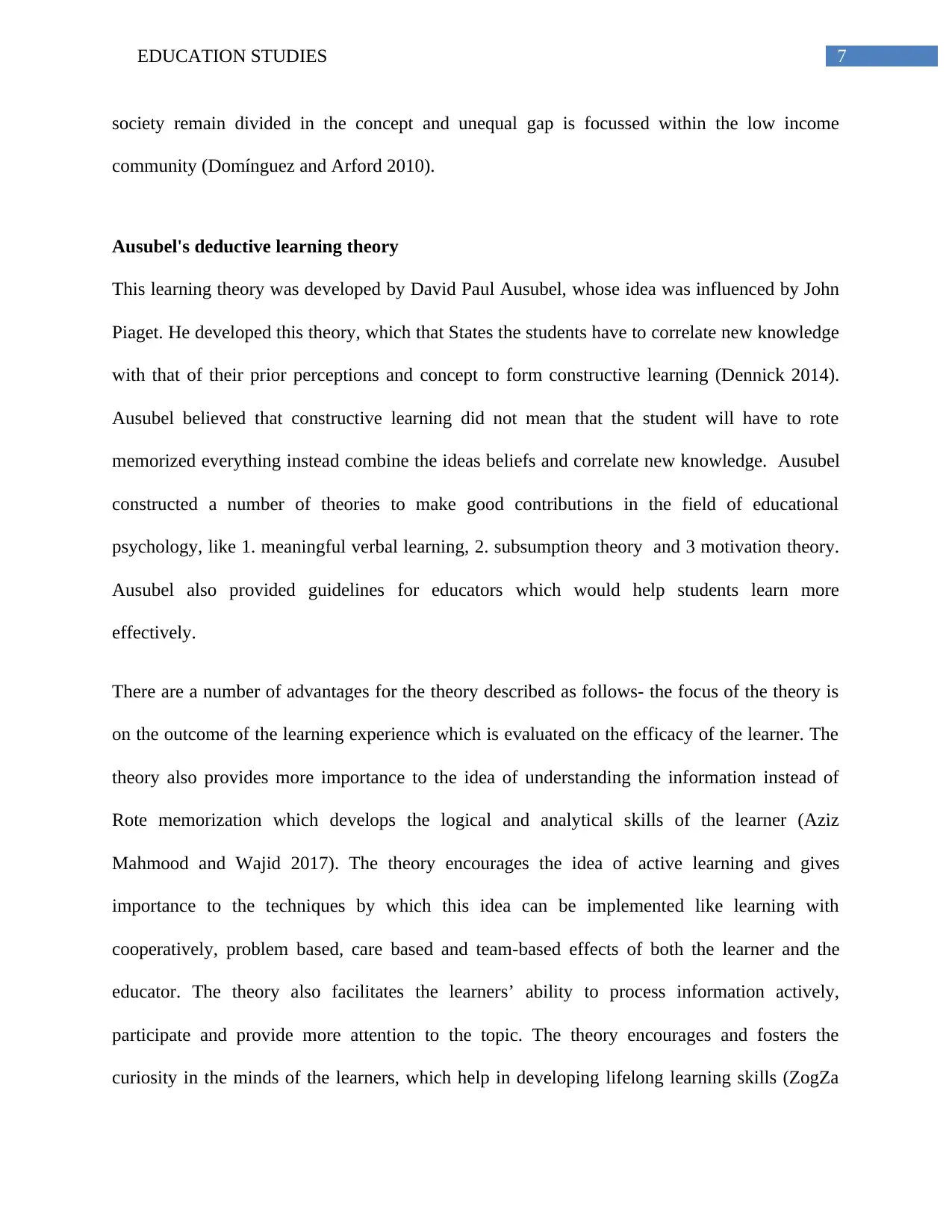
7EDUCATION STUDIES
society remain divided in the concept and unequal gap is focussed within the low income
community (Domínguez and Arford 2010).
Ausubel's deductive learning theory
This learning theory was developed by David Paul Ausubel, whose idea was influenced by John
Piaget. He developed this theory, which that States the students have to correlate new knowledge
with that of their prior perceptions and concept to form constructive learning (Dennick 2014).
Ausubel believed that constructive learning did not mean that the student will have to rote
memorized everything instead combine the ideas beliefs and correlate new knowledge. Ausubel
constructed a number of theories to make good contributions in the field of educational
psychology, like 1. meaningful verbal learning, 2. subsumption theory and 3 motivation theory.
Ausubel also provided guidelines for educators which would help students learn more
effectively.
There are a number of advantages for the theory described as follows- the focus of the theory is
on the outcome of the learning experience which is evaluated on the efficacy of the learner. The
theory also provides more importance to the idea of understanding the information instead of
Rote memorization which develops the logical and analytical skills of the learner (Aziz
Mahmood and Wajid 2017). The theory encourages the idea of active learning and gives
importance to the techniques by which this idea can be implemented like learning with
cooperatively, problem based, care based and team-based effects of both the learner and the
educator. The theory also facilitates the learners’ ability to process information actively,
participate and provide more attention to the topic. The theory encourages and fosters the
curiosity in the minds of the learners, which help in developing lifelong learning skills (ZogZa
society remain divided in the concept and unequal gap is focussed within the low income
community (Domínguez and Arford 2010).
Ausubel's deductive learning theory
This learning theory was developed by David Paul Ausubel, whose idea was influenced by John
Piaget. He developed this theory, which that States the students have to correlate new knowledge
with that of their prior perceptions and concept to form constructive learning (Dennick 2014).
Ausubel believed that constructive learning did not mean that the student will have to rote
memorized everything instead combine the ideas beliefs and correlate new knowledge. Ausubel
constructed a number of theories to make good contributions in the field of educational
psychology, like 1. meaningful verbal learning, 2. subsumption theory and 3 motivation theory.
Ausubel also provided guidelines for educators which would help students learn more
effectively.
There are a number of advantages for the theory described as follows- the focus of the theory is
on the outcome of the learning experience which is evaluated on the efficacy of the learner. The
theory also provides more importance to the idea of understanding the information instead of
Rote memorization which develops the logical and analytical skills of the learner (Aziz
Mahmood and Wajid 2017). The theory encourages the idea of active learning and gives
importance to the techniques by which this idea can be implemented like learning with
cooperatively, problem based, care based and team-based effects of both the learner and the
educator. The theory also facilitates the learners’ ability to process information actively,
participate and provide more attention to the topic. The theory encourages and fosters the
curiosity in the minds of the learners, which help in developing lifelong learning skills (ZogZa
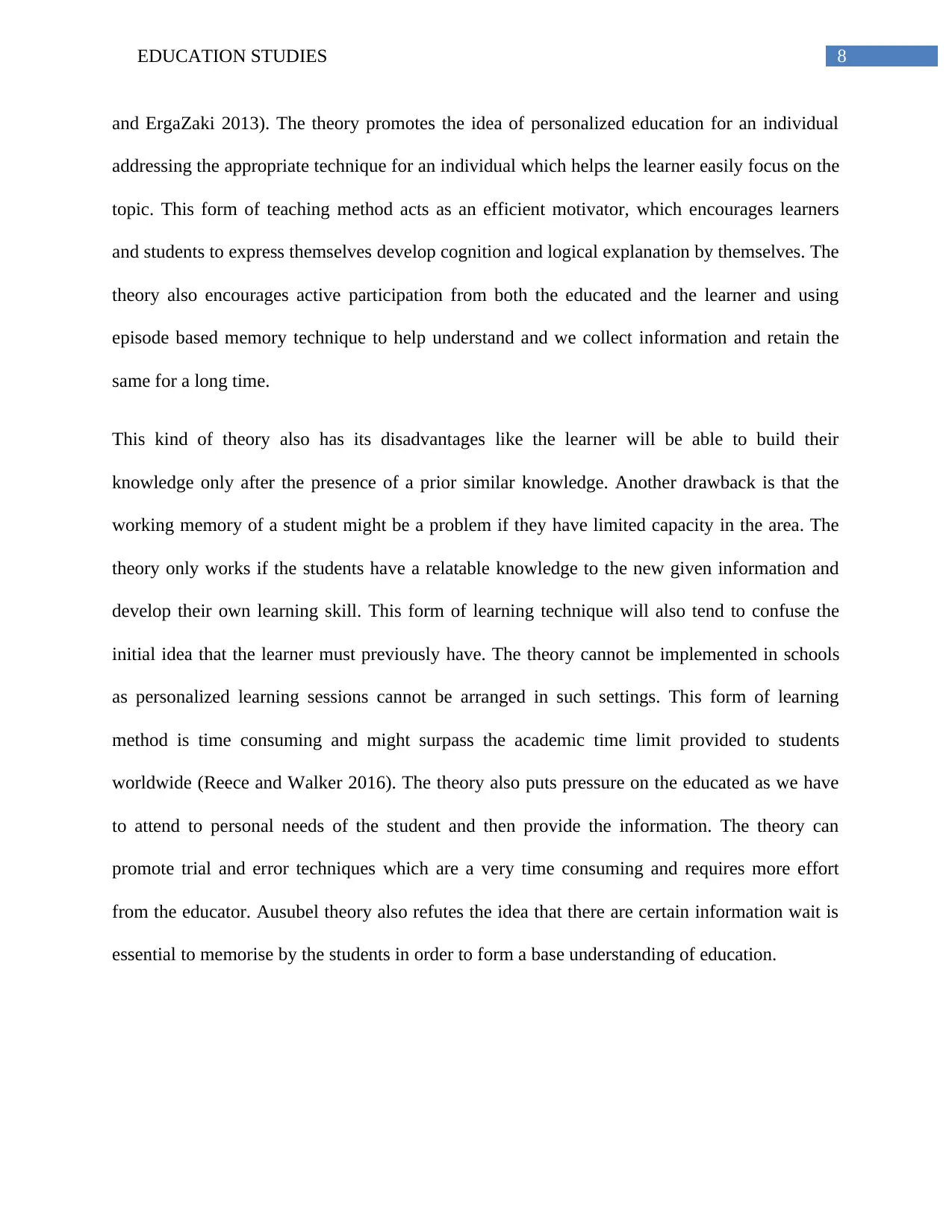
8EDUCATION STUDIES
and ErgaZaki 2013). The theory promotes the idea of personalized education for an individual
addressing the appropriate technique for an individual which helps the learner easily focus on the
topic. This form of teaching method acts as an efficient motivator, which encourages learners
and students to express themselves develop cognition and logical explanation by themselves. The
theory also encourages active participation from both the educated and the learner and using
episode based memory technique to help understand and we collect information and retain the
same for a long time.
This kind of theory also has its disadvantages like the learner will be able to build their
knowledge only after the presence of a prior similar knowledge. Another drawback is that the
working memory of a student might be a problem if they have limited capacity in the area. The
theory only works if the students have a relatable knowledge to the new given information and
develop their own learning skill. This form of learning technique will also tend to confuse the
initial idea that the learner must previously have. The theory cannot be implemented in schools
as personalized learning sessions cannot be arranged in such settings. This form of learning
method is time consuming and might surpass the academic time limit provided to students
worldwide (Reece and Walker 2016). The theory also puts pressure on the educated as we have
to attend to personal needs of the student and then provide the information. The theory can
promote trial and error techniques which are a very time consuming and requires more effort
from the educator. Ausubel theory also refutes the idea that there are certain information wait is
essential to memorise by the students in order to form a base understanding of education.
and ErgaZaki 2013). The theory promotes the idea of personalized education for an individual
addressing the appropriate technique for an individual which helps the learner easily focus on the
topic. This form of teaching method acts as an efficient motivator, which encourages learners
and students to express themselves develop cognition and logical explanation by themselves. The
theory also encourages active participation from both the educated and the learner and using
episode based memory technique to help understand and we collect information and retain the
same for a long time.
This kind of theory also has its disadvantages like the learner will be able to build their
knowledge only after the presence of a prior similar knowledge. Another drawback is that the
working memory of a student might be a problem if they have limited capacity in the area. The
theory only works if the students have a relatable knowledge to the new given information and
develop their own learning skill. This form of learning technique will also tend to confuse the
initial idea that the learner must previously have. The theory cannot be implemented in schools
as personalized learning sessions cannot be arranged in such settings. This form of learning
method is time consuming and might surpass the academic time limit provided to students
worldwide (Reece and Walker 2016). The theory also puts pressure on the educated as we have
to attend to personal needs of the student and then provide the information. The theory can
promote trial and error techniques which are a very time consuming and requires more effort
from the educator. Ausubel theory also refutes the idea that there are certain information wait is
essential to memorise by the students in order to form a base understanding of education.
⊘ This is a preview!⊘
Do you want full access?
Subscribe today to unlock all pages.

Trusted by 1+ million students worldwide
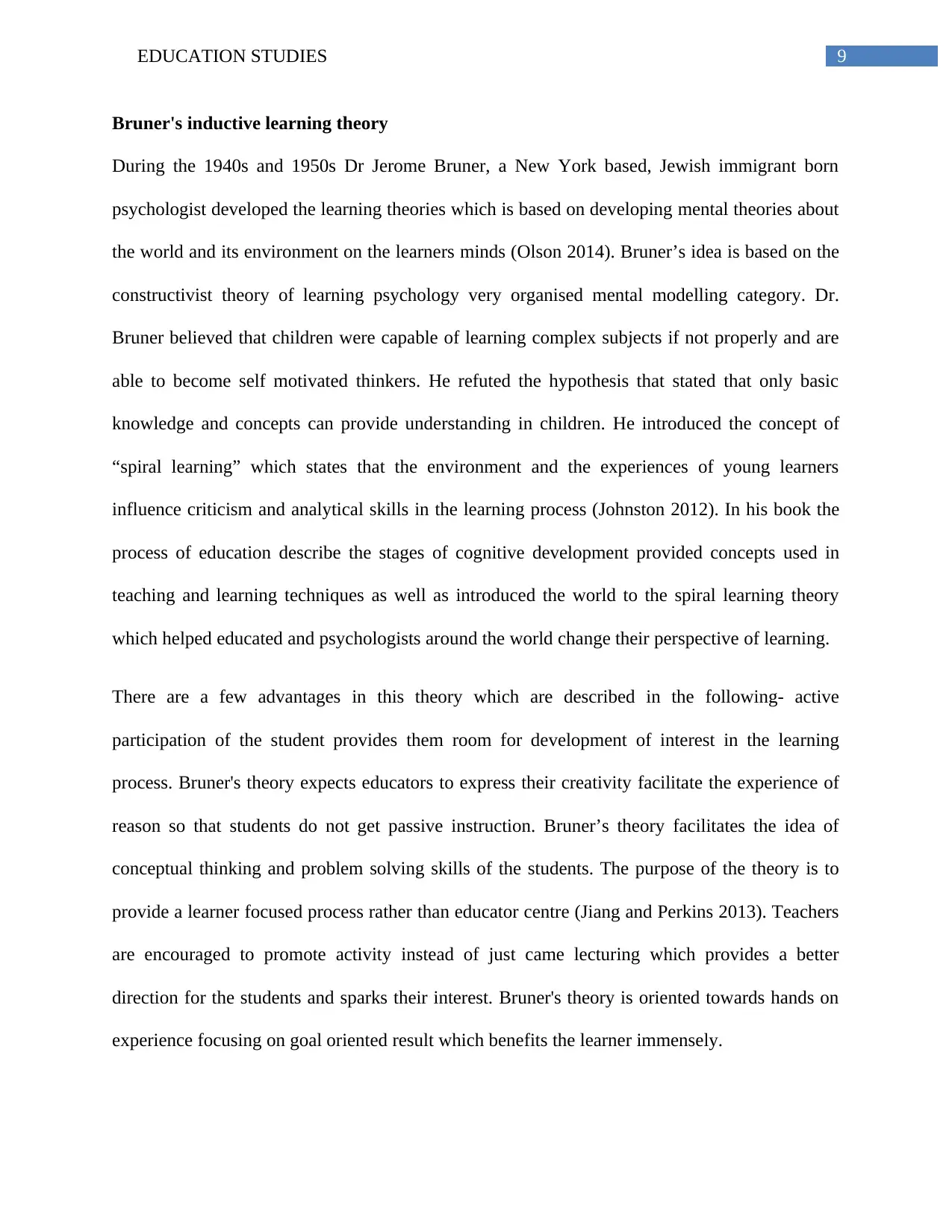
9EDUCATION STUDIES
Bruner's inductive learning theory
During the 1940s and 1950s Dr Jerome Bruner, a New York based, Jewish immigrant born
psychologist developed the learning theories which is based on developing mental theories about
the world and its environment on the learners minds (Olson 2014). Bruner’s idea is based on the
constructivist theory of learning psychology very organised mental modelling category. Dr.
Bruner believed that children were capable of learning complex subjects if not properly and are
able to become self motivated thinkers. He refuted the hypothesis that stated that only basic
knowledge and concepts can provide understanding in children. He introduced the concept of
“spiral learning” which states that the environment and the experiences of young learners
influence criticism and analytical skills in the learning process (Johnston 2012). In his book the
process of education describe the stages of cognitive development provided concepts used in
teaching and learning techniques as well as introduced the world to the spiral learning theory
which helped educated and psychologists around the world change their perspective of learning.
There are a few advantages in this theory which are described in the following- active
participation of the student provides them room for development of interest in the learning
process. Bruner's theory expects educators to express their creativity facilitate the experience of
reason so that students do not get passive instruction. Bruner’s theory facilitates the idea of
conceptual thinking and problem solving skills of the students. The purpose of the theory is to
provide a learner focused process rather than educator centre (Jiang and Perkins 2013). Teachers
are encouraged to promote activity instead of just came lecturing which provides a better
direction for the students and sparks their interest. Bruner's theory is oriented towards hands on
experience focusing on goal oriented result which benefits the learner immensely.
Bruner's inductive learning theory
During the 1940s and 1950s Dr Jerome Bruner, a New York based, Jewish immigrant born
psychologist developed the learning theories which is based on developing mental theories about
the world and its environment on the learners minds (Olson 2014). Bruner’s idea is based on the
constructivist theory of learning psychology very organised mental modelling category. Dr.
Bruner believed that children were capable of learning complex subjects if not properly and are
able to become self motivated thinkers. He refuted the hypothesis that stated that only basic
knowledge and concepts can provide understanding in children. He introduced the concept of
“spiral learning” which states that the environment and the experiences of young learners
influence criticism and analytical skills in the learning process (Johnston 2012). In his book the
process of education describe the stages of cognitive development provided concepts used in
teaching and learning techniques as well as introduced the world to the spiral learning theory
which helped educated and psychologists around the world change their perspective of learning.
There are a few advantages in this theory which are described in the following- active
participation of the student provides them room for development of interest in the learning
process. Bruner's theory expects educators to express their creativity facilitate the experience of
reason so that students do not get passive instruction. Bruner’s theory facilitates the idea of
conceptual thinking and problem solving skills of the students. The purpose of the theory is to
provide a learner focused process rather than educator centre (Jiang and Perkins 2013). Teachers
are encouraged to promote activity instead of just came lecturing which provides a better
direction for the students and sparks their interest. Bruner's theory is oriented towards hands on
experience focusing on goal oriented result which benefits the learner immensely.
Paraphrase This Document
Need a fresh take? Get an instant paraphrase of this document with our AI Paraphraser
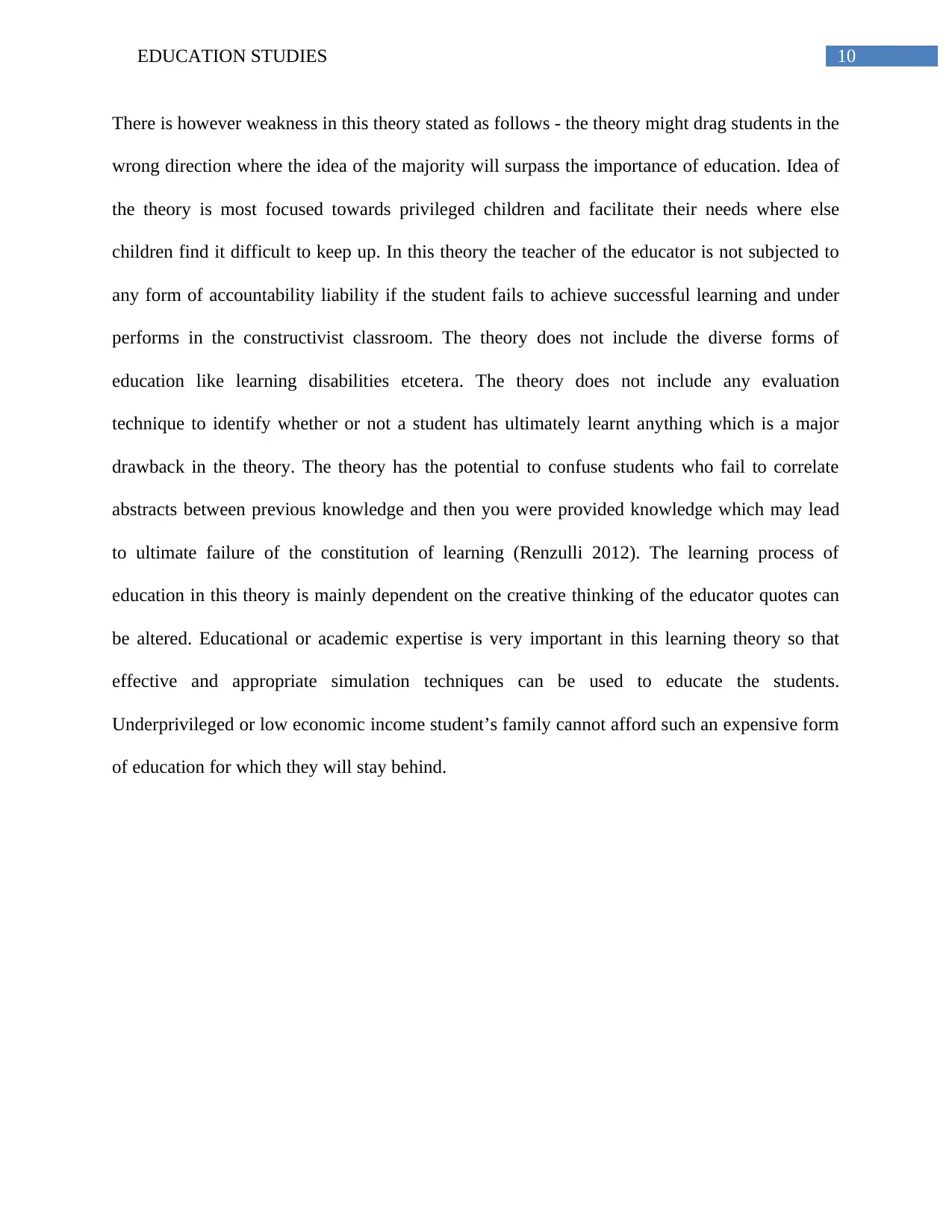
10EDUCATION STUDIES
There is however weakness in this theory stated as follows - the theory might drag students in the
wrong direction where the idea of the majority will surpass the importance of education. Idea of
the theory is most focused towards privileged children and facilitate their needs where else
children find it difficult to keep up. In this theory the teacher of the educator is not subjected to
any form of accountability liability if the student fails to achieve successful learning and under
performs in the constructivist classroom. The theory does not include the diverse forms of
education like learning disabilities etcetera. The theory does not include any evaluation
technique to identify whether or not a student has ultimately learnt anything which is a major
drawback in the theory. The theory has the potential to confuse students who fail to correlate
abstracts between previous knowledge and then you were provided knowledge which may lead
to ultimate failure of the constitution of learning (Renzulli 2012). The learning process of
education in this theory is mainly dependent on the creative thinking of the educator quotes can
be altered. Educational or academic expertise is very important in this learning theory so that
effective and appropriate simulation techniques can be used to educate the students.
Underprivileged or low economic income student’s family cannot afford such an expensive form
of education for which they will stay behind.
There is however weakness in this theory stated as follows - the theory might drag students in the
wrong direction where the idea of the majority will surpass the importance of education. Idea of
the theory is most focused towards privileged children and facilitate their needs where else
children find it difficult to keep up. In this theory the teacher of the educator is not subjected to
any form of accountability liability if the student fails to achieve successful learning and under
performs in the constructivist classroom. The theory does not include the diverse forms of
education like learning disabilities etcetera. The theory does not include any evaluation
technique to identify whether or not a student has ultimately learnt anything which is a major
drawback in the theory. The theory has the potential to confuse students who fail to correlate
abstracts between previous knowledge and then you were provided knowledge which may lead
to ultimate failure of the constitution of learning (Renzulli 2012). The learning process of
education in this theory is mainly dependent on the creative thinking of the educator quotes can
be altered. Educational or academic expertise is very important in this learning theory so that
effective and appropriate simulation techniques can be used to educate the students.
Underprivileged or low economic income student’s family cannot afford such an expensive form
of education for which they will stay behind.
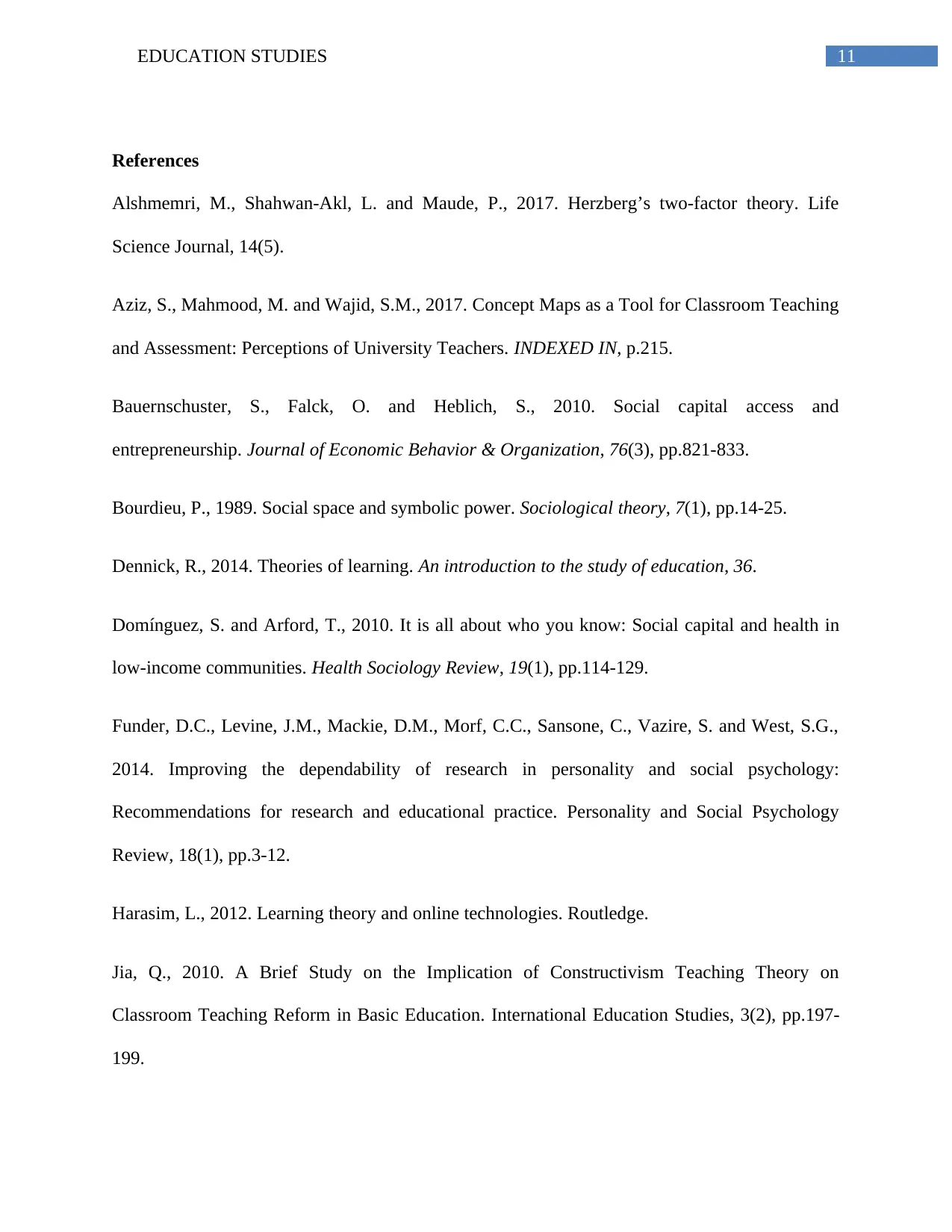
11EDUCATION STUDIES
References
Alshmemri, M., Shahwan-Akl, L. and Maude, P., 2017. Herzberg’s two-factor theory. Life
Science Journal, 14(5).
Aziz, S., Mahmood, M. and Wajid, S.M., 2017. Concept Maps as a Tool for Classroom Teaching
and Assessment: Perceptions of University Teachers. INDEXED IN, p.215.
Bauernschuster, S., Falck, O. and Heblich, S., 2010. Social capital access and
entrepreneurship. Journal of Economic Behavior & Organization, 76(3), pp.821-833.
Bourdieu, P., 1989. Social space and symbolic power. Sociological theory, 7(1), pp.14-25.
Dennick, R., 2014. Theories of learning. An introduction to the study of education, 36.
Domínguez, S. and Arford, T., 2010. It is all about who you know: Social capital and health in
low-income communities. Health Sociology Review, 19(1), pp.114-129.
Funder, D.C., Levine, J.M., Mackie, D.M., Morf, C.C., Sansone, C., Vazire, S. and West, S.G.,
2014. Improving the dependability of research in personality and social psychology:
Recommendations for research and educational practice. Personality and Social Psychology
Review, 18(1), pp.3-12.
Harasim, L., 2012. Learning theory and online technologies. Routledge.
Jia, Q., 2010. A Brief Study on the Implication of Constructivism Teaching Theory on
Classroom Teaching Reform in Basic Education. International Education Studies, 3(2), pp.197-
199.
References
Alshmemri, M., Shahwan-Akl, L. and Maude, P., 2017. Herzberg’s two-factor theory. Life
Science Journal, 14(5).
Aziz, S., Mahmood, M. and Wajid, S.M., 2017. Concept Maps as a Tool for Classroom Teaching
and Assessment: Perceptions of University Teachers. INDEXED IN, p.215.
Bauernschuster, S., Falck, O. and Heblich, S., 2010. Social capital access and
entrepreneurship. Journal of Economic Behavior & Organization, 76(3), pp.821-833.
Bourdieu, P., 1989. Social space and symbolic power. Sociological theory, 7(1), pp.14-25.
Dennick, R., 2014. Theories of learning. An introduction to the study of education, 36.
Domínguez, S. and Arford, T., 2010. It is all about who you know: Social capital and health in
low-income communities. Health Sociology Review, 19(1), pp.114-129.
Funder, D.C., Levine, J.M., Mackie, D.M., Morf, C.C., Sansone, C., Vazire, S. and West, S.G.,
2014. Improving the dependability of research in personality and social psychology:
Recommendations for research and educational practice. Personality and Social Psychology
Review, 18(1), pp.3-12.
Harasim, L., 2012. Learning theory and online technologies. Routledge.
Jia, Q., 2010. A Brief Study on the Implication of Constructivism Teaching Theory on
Classroom Teaching Reform in Basic Education. International Education Studies, 3(2), pp.197-
199.
⊘ This is a preview!⊘
Do you want full access?
Subscribe today to unlock all pages.

Trusted by 1+ million students worldwide
1 out of 15
Related Documents
Your All-in-One AI-Powered Toolkit for Academic Success.
+13062052269
info@desklib.com
Available 24*7 on WhatsApp / Email
![[object Object]](/_next/static/media/star-bottom.7253800d.svg)
Unlock your academic potential
Copyright © 2020–2025 A2Z Services. All Rights Reserved. Developed and managed by ZUCOL.





